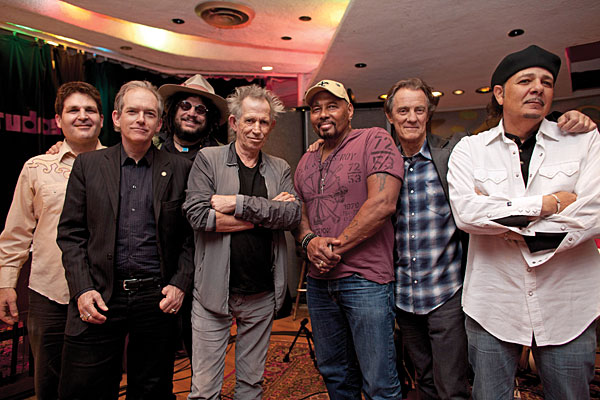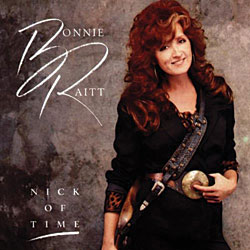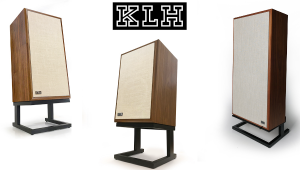While he clearly does try to make the artists more of who they are and not into his creations, there's something that is Was in every one of them. But as much as I enjoy all of Don's producing other artists, and his work at Blue Note - I really wish there were more Was (Not Was) and Orquestra Was releases on their way. Sophisticated funky music (I dare you to not dance) with hilariously orthogonal lyrics. The albums have remained in high rotation on my listening list for years.
Grammy Award-Winning Producer Don Was

Steve Guttenberg: Don, this may sound like an odd way to start, but how do you think the Beatles’ sound would have differed if they never met George Martin and instead worked with the Rolling Stones’ producer, Andrew Loog Oldham?
Don Was: For the early records, not at all, they just went in and played. That’s what they sounded like at the time. Listen to the Beatles’ Live at the BBC recordings; they sound like the early records.
SG: George Martin just let them be.
DW: The producer’s gig is helping realize the artist’s vision in the most splendid way possible. That’s why it’s an enigmatic assignment, because every artist is different. So what you saw with the Beatles and George Martin and the Stones with Andrew was that they didn’t try to leave their thumbprints on the foreheads of the artists. It’s probably not out of line to say the Stones couldn’t have created that body of work without Andrew, and the same for the Beatles and George Martin. Both bands found exactly the right cat to do the job.
SG: Speaking of the right cat, how did Keith Richards get involved in Aaron Neville’s doo-wop record?
DW: When I made Voodoo Lounge with the Stones in 1993, we were in Dublin and I had the hotel room right above Keith’s. It was a good musical education, especially in doo-wop because all he played for six weeks was the Jive Five’s Greatest Hits, so I knew he loved the music. When Aaron called and said he wanted to make a doo-wop record, I felt we had to do something different with the music. Keith was the perfect guy because he’s all about listening and being spontaneous and doing something new. He played guitar on everything and even danced with Aaron! Keith brought in Eugene Pitt from the Jive Five to sing backgrounds.

SG: You’re mostly known now for your work as a producer, but do you still play?
DW: I just had an incredible experience. I was a hired bass player on Ryan Adams’ new one, with Glyn Johns producing. It wasn’t easy to stop being the producer; I really had to bite my tongue a number of times. Not because I saw Glyn doing anything wrong, but I’m the one that’s supposed to have the fucking answer when the artist looks at you. Not this time—I’m just the bass player, and if what you say differs from what the producer wants, you’re getting in the way. After a take with the full band, I listened to the playback, and I’m thinking Glyn’s got his work cut out for him. But last night when I heard the mixes, they were magnificent! The sound was so warm, there was no harshness to it at all, and I thought this guy really is great! He carved out an amazing space and got all the relationships between the instruments just right.
SG: That sounds not so different than what you did on Aaron’s album, where you recorded complete performances. You didn’t assemble tunes from bits and pieces of sound on a computer.
DW: There’s no right or wrong way of doing it, everyone approaches the gig differently. If you do it in GarageBand [Apple’s music editing app] or work with a live band and capture it on analog tape in a pristine fashion, it’s all legitimate. I like to work with a strong point of view, so the better the artist’s vision, the better producer I appear to be. [laughs] Some producers write the songs, make the tracks, and lay down guide vocals. The singer comes in, and the producer says, ‘Sing it just like I sang it.’ You really have to do that when you’re working with someone who barely qualifies for the singer occupation [laughs], and it’s perfectly legitimate. I could take the guitar out of the guy’s hand and say, ‘Play it like this,’ but I’ve never, ever done that. I try to get players that are better than me. That’s a crucial part of producing records, casting the right musicians for each song.
SG: Dylan had a knack for that when he was doing the Under the Red Sky sessions.
DW: He was hanging with George [Harrison] at the time, so he asked him to come in and play on a song. George said the last time he came in, Bob wouldn’t let him tune his guitar, he just turned the tape machine on. Bob was messing with him and asked him to start, but George doesn’t even know what key the song’s in, so he just plays something, and Bob says, ‘Yeah, that’s perfect.’ Then they both turn to me and say, ‘What do you think, Don?’ [laughs] It was like time slowed down and everything got kind of echo-y, and when I looked at them, it was like The Concert for Bangladesh was 3 feet in front of me! I’m thinking, What do you do here? Bob’s not paying me to be a fan and gush; he’s paying me to be objective. So I said to George, ‘That was good, but try another take. You can probably do it better.’ George said, ‘Thank you,’ and Bob just laughed. I guess it was a bit of a test, I don’t know, but then George played a great solo.

SG: When I listened to another record you produced, Lucinda Williams’ Blessed, I thought, Don likes to work with emotionally naked artists. Is that true?
DW: Well, yeah, you try and do that. When I’ve made records with people who weren’t willing to bleed a little in their songwriting or dig in deep to tap their own feelings, they’re mediocre records. It’s not that hard to make a decent record that has musical value, but to soar above mediocrity requires some magic. I don’t know how to make that happen if the artist doesn’t show up emotionally.
SG: I should have asked this before: How did you get to work with Dylan? You hadn’t produced too many records at the time.
 DW: I was hired to score a movie, The Freshman, with Marlon Brando and Matthew Broderick. It’s a light comedy where Brando reprised his godfather bit. There’s a scene where Bert Parks [the longtime host of the Miss America Pageant] sings “Maggie’s Farm” at a banquet, with my band. This was in Toronto, and Dylan was in town. When I met him backstage, I didn’t want to go empty-handed, so I gave him a cassette of “Maggie’s Farm,” a VHS tape of The Garden of the Finzi–Continis we stole from a local video rental store, and a bag of microwave popcorn for the bus ride to the next gig, which I think he really appreciated! We got on well enough, and a short while later he called and asked if I wanted to produce a couple of songs. At that point we had a choice to do Dylan or finish the movie score, so we took the Dylan gig.
DW: I was hired to score a movie, The Freshman, with Marlon Brando and Matthew Broderick. It’s a light comedy where Brando reprised his godfather bit. There’s a scene where Bert Parks [the longtime host of the Miss America Pageant] sings “Maggie’s Farm” at a banquet, with my band. This was in Toronto, and Dylan was in town. When I met him backstage, I didn’t want to go empty-handed, so I gave him a cassette of “Maggie’s Farm,” a VHS tape of The Garden of the Finzi–Continis we stole from a local video rental store, and a bag of microwave popcorn for the bus ride to the next gig, which I think he really appreciated! We got on well enough, and a short while later he called and asked if I wanted to produce a couple of songs. At that point we had a choice to do Dylan or finish the movie score, so we took the Dylan gig.
SG: Good move. How do you get most gigs? You call them, or they call you?
DW: I only called someone once. I called Neil Diamond in 1989 and said, ‘Neil, I think you’re a rock ’n’ roll artist, but you lost your way, and I know how to make it right.’
SG: You opened with that?
DW: It was such an arrogant, obnoxious thing to say. I know him now and I think I made it right. He was silent for a second and then said, ‘I don’t know what you’re talking about, but if you want to make a record together, I’d love to.’ I had specific ideas, pretty much the same things [producer] Rick Rubin told him 25 years later, but he didn’t want to hear it in 1989. I wanted him to drive the songs with his acoustic guitar; it was the essence of his great early records. When I did go in the studio with him, I learned he hadn’t lost his way at all, but he didn’t want to make those sorts of records anymore. That was the only time I ever hustled an artist. It’s kind of unseemly to go around hustling up work.
 SG: So other than Diamond, the other artists—like Bonnie Raitt—called you, and she had her first mega sellers with you.
SG: So other than Diamond, the other artists—like Bonnie Raitt—called you, and she had her first mega sellers with you.
DW: Love Shack and Nick of Time won a lot of Grammys, but whoever produced those records would have been lucky; she was ready to go. She had sobered up and took those feelings that she had been drowning out and exorcised them through songwriting and performing.
SG: When you have your first meeting with an artist, do they play the tunes for you?
DW: Sure, it’s about songs and how you’re going to treat them. A different kind of producer might say, ‘Let’s write together,’ but that’s not my strength. My signature sound is that I don’t have a signature sound. It’s a deliberate thing. I believe the producer is supposed to be invisible and get inside the artist’s head and help them realize this thing that they’re hearing. At some point during the making of a record, the artist loses all objectivity and starts ruminating about it. They wake up at 2:00 in the morning and don’t know if it’s the greatest record anyone’s ever made in the history of the universe or the biggest piece of shit that anyone’s ever recorded. If they don’t hit that point, I worry; it means it’s not going to be a good record. They haven’t really given it all up. They should have doubts, they should have trouble sleeping.
SG: So when you get the call, what do you say to them?
DW: I liken it to Ben Franklin flying the kite—you want the lightning to strike, but someone has to hold the motherfucker down. I’m grounded, and you have to tell them the truth.
SG: What if they’re having a bad week, will you tell them they suck?
DW: You have to be a gentleman about it. I’ve been produced and know what it’s like to get in touch with something inside and let it out, and then some motherfucker producer doesn’t press the talkback button because he’s busy ordering a sandwich. Then he finally presses the button and says, ‘Let’s try another one.’ Really? You’re my high-priced tour guide and you don’t have anything to say about that? You lose an artist right there.
 SG: I can’t help but notice you have a lot of guest artists dropping in on your sessions.
SG: I can’t help but notice you have a lot of guest artists dropping in on your sessions.
DW: It’s different every time, like on the John Mayer Born and Raised record, we had David Crosby and Graham Nash sing backgrounds. If you heard the song without them, you’d think, This needs harmony. And they were absolutely perfect. That was just evident, the song screamed out for them, for their textures and the notes they choose. They worked hard and were thrilled to do it; it was fucking amazing! No one gets that sound, except those guys together.
SG: I suppose part of the producer’s gig is working within the budget the record label is offering.
DW: Yup, you can try and come up with a plan, but it’s going to change the first minute you’re in there because when you hear the song and start thinking about bringing in a musician and in three hours we’ll have it. Maybe a sousaphone player will come in for an hour and the studio time will cost this much. There’s a production coordinator to help with those things.
SG: Do you prefer to work with the same engineers from project to project?
DW: It’s nice when you don’t have to explain yourself every two seconds. You try to work with people you trust; it’s a good way to do everything. If there’s something I don’t like, I might make a suggestion, like, ‘That sounds a little too bright’ or ‘We need some room sound.’ I’ve been really lucky enough to have long relationships with guys like Ed Cherney, Rik Pekkonen, and Howard Willing. For mixes I’ve been working with Bob Clearmountain. He works so quickly, I don’t leave his studio between mixes and get a bite to eat. If something bugs me, it takes two seconds to fix.
SG: Where do you stand with computer editing systems like Pro Tools?
DW: Yeah, I can tell myself that Pro Tools is so much easier and you learn to compensate, but the sound that Glyn got on that Ryan Adams session really was better, because it was 24-track, 2-inch analog tape, and he mixed to half-inch tape. It really does sound awesome. There were no computers in the room and no automation on the [mixing] board.
SG: How about high-resolution digital?
DW: When you listen to the high-resolution versions, music has the warmth you get from vinyl, but it also has the depth and transparency you can only get from higher-resolution digital. It’s a great experience. I hope people get to hear Aaron’s album in high res [available on HDtracks].
SG: You’ve worked as a producer for the Rolling Stones, in the studio and the reissues, too.
DW: Right, we did the reissues of Exile on Main Street with Glyn [Johns, who also did the original recordings], and when he brought up the faders to ‘0’ on the eight-track, the mix was basically done!
SG: The previously unreleased tracks have newly recorded vocals, right?
DW: Some were finished, some tracks had no vocals at all, they were just instrumental tracks, so Jagger wrote new lyrics and sang. Other tracks had bits of vocal or he mumbled, so he finished those songs.
SG: You produced two of my favorite late-period live Stones records, Stripped and Live Licks. What does a producer do for live sessions?
DW: [laughs] He chooses the best takes, but it depends. There might be some overdubbing, but that really doesn’t make sense for the Stones. They never play it the same way twice. You just listen and pick a performance. With Keith, he’s not just playing the chorus; for him it’s a performance that builds over the length of the song, it’s a complete statement. He’s playing to the vocal and drums; it’s more like jazz, really. The producer isn’t going to punch things in or move things around, it’s of the moment.
SG: Stripped has a very different feel than their other live records.
DW: I learned a lot doing Stripped. Parts of it were meant to be an unplugged deal; we went into a studio in Tokyo for two nights and did acoustic versions of a whole bunch of songs, and that was supposed to be it. It was filmed, and some of that survives, which is about half the record, but they didn’t want to put that out. So we started recording with electric guitars and did some semi-acoustic shows.
At that point, Don was called into a meeting and had to attend to his duties as the president of Blue Note, so we said our good-byes. I still had a ton of questions, but I learned the producer is a guide—he or she has to be a shrink, sage, music confidant, overseer, and whatever it takes to realize or enhance the artist’s vision. That’s what Don Was does when he’s not running a record company. I can’t wait to hear his next project.
- Log in or register to post comments































































